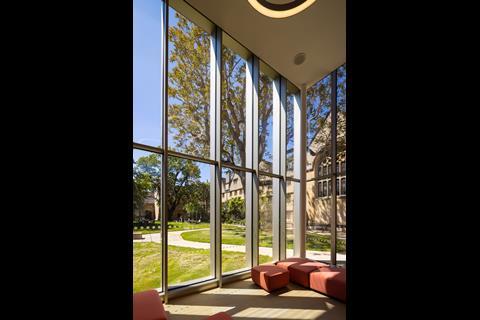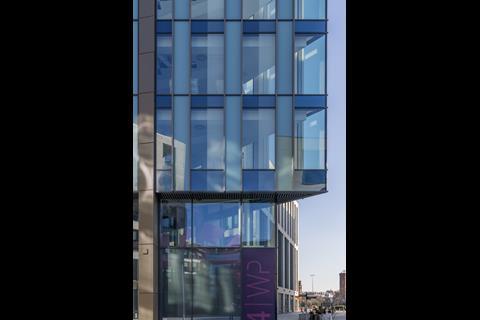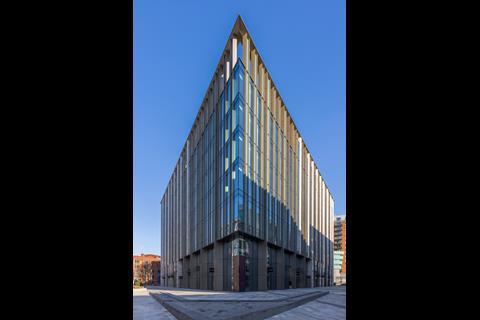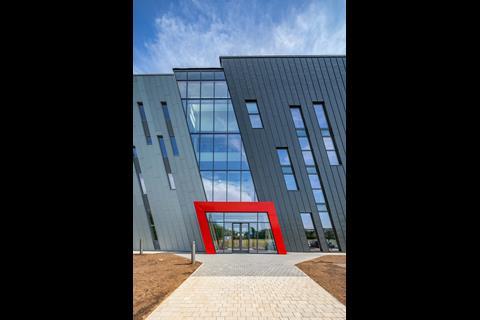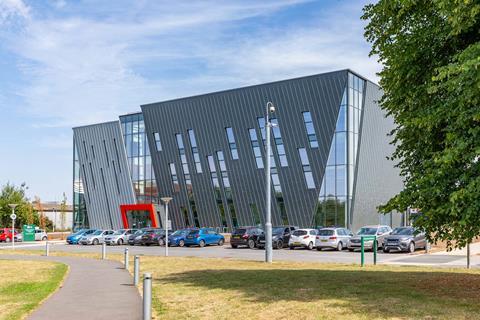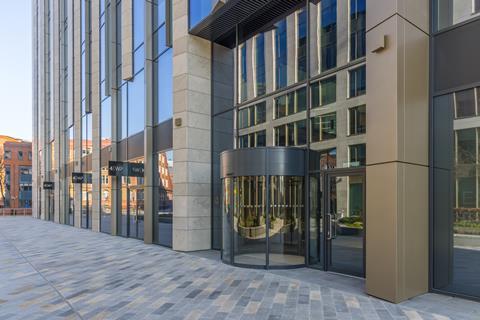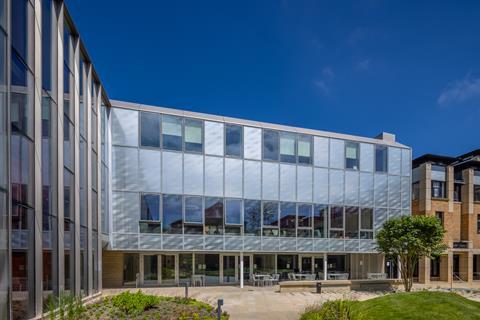Firm’s new branding signals a commitment to a socially responsible future, writes Wojciech Brozyna, managing director of Aluprof UK
It seems wherever we are today we are reminded that we are a generation that has to curb our carbon emissions in order to save the planet for future generations. The fact that we have already increased the average temperature on earth by approximately 1ºC above pre-industrial levels and that it is on course to increase more rapidly and reach a total of 1.5ºC to 2.0ºC by 2050. Buildings and construction account for more than 35% of global final energy use and nearly 40% of energy-related CO2 emissions. Clearly, with facts like these the construction industry is a prime target for carbon reduction, but the full picture is a little more complex.
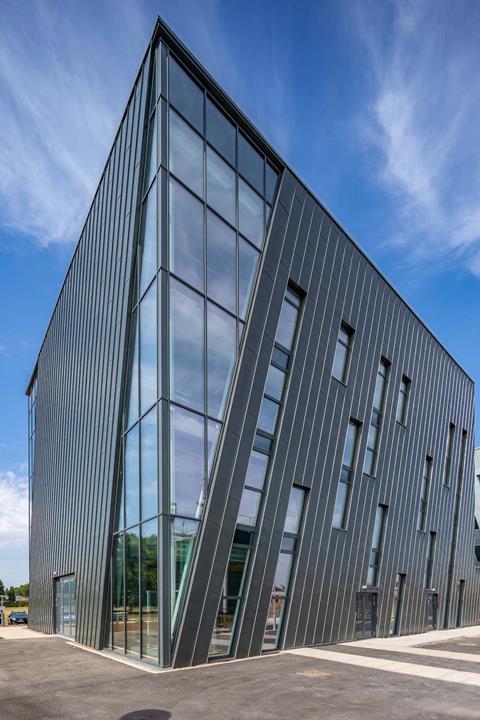
First, we often have the building deconstruction phase, using energy, while hopefully recycling as much material as possible. We then start the ‘build phase’ where all materials supplied to a project site carry some form of embodied carbon, followed by the construction phase which adds even more carbon into the materials used. Once in use, we have a building that may use further carbon fuels during its lifetime, unless it is designed to be carbon neutral in use.
While the build phase uses energy, which contributes to its carbon impact, this can pale into insignificance when we consider the building ‘use’ phase, as if the insulation is poor, vast amounts of energy can be wasted. It is therefore crucial to design with the very best, modern products, that help conserve energy. Clearly, buildings must be designed in future to last a very long time which further reduces the construction carbon impact, likewise, products that offer very high levels of insulation and sustainability, help keep the interior environment at a comfortable level and offer a lifetime of use.
Aluminium fenestration has long been associated with extensive life expectancy and can offer reduced maintenance while maintaining operational efficiency with high thermal efficiency. Perhaps the ‘golden egg’ would be to construct a building to be carbon positive in use, where it can actually save more carbon in its lifetime as it ‘costs’ in carbon to build? Aluprof, part of the Kęty Group, are working with environmental experts across the construction sector who are in turn continuing to push the boundaries of what is achievable for all our customers. To this end Aluprof UK have now joint the Passivhaus UK Trust as a patron member.
To further enhance aluminium’s enduring life expectancy, Aluprof are licensed applicators to the global QUALICOAT standard for architectural powder coating and can offer various substantial aluminium pretreatments and more durable classes of powder coating to meet any specification. Aluprof are also license holders of QUALANOD, a further global standard for the provision of high-quality anodising. Together these finishes can easily extend the life expectancy of Aluprof’s products for future generations.
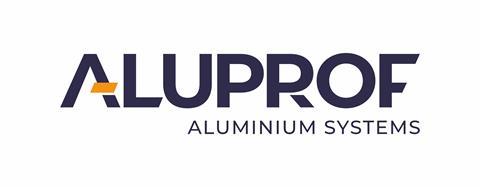
Aluprof, who are a Polish-based aluminium systems company, have had a base in the UK now for fifteen years, supplying a wide range of high-performance systems, products which have seen the company become one of the leading systems suppliers in the UK.
In a recent statement from the Polish head office, Aluprof has made a clear commitment to further reducing its environmental impact:
“As part of its newly announced strategy, Aluprof will be continuing with its work on promoting the concept of sustainable development. Environmental and social objectives stand out amidst the company’s’ many commitments, which include obtaining further Cradle to Cradle™ certifications and the ongoing improvement of its manufacturing processes under the ISO 14001 environmental management system. The company is introducing a range of initiatives aimed at eliminating the impact of its operations on the environment. It has updated its detailed analysis of its products’ carbon footprint and presented its commitments in terms of sustainable development. One of its many environmental ambitions is to move towards achieving climate neutrality.”
One key to this goal is the company’s use of low-carbon aluminium. Aluprof’s modern extrusion plant uses low-carbon billet which equates to just 2.79 tCO2e. In comparison, the average production of one ton of aluminium primary aluminium somewhere in the world has an emission of 16.7 tCO2e, almost six times higher. The low level of carbon emissions is achieved thanks to the efficiency of the company’s new, cutting-edge plant for manufacturing, the use of low-carbon aluminium and the use of up to 65% of recycled aluminium content in Aluprof’s extrusion billet.
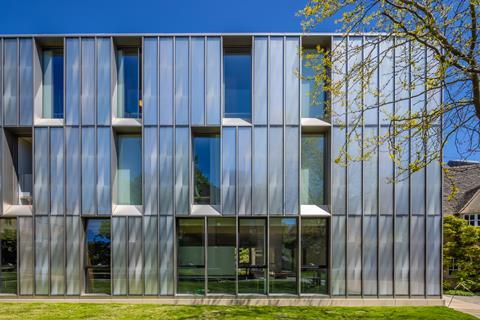
To further reduce carbon emissions in the distribution of aluminium systems and products, Aluprof have developed a logistics network across Europe which reduces the need to stock materials locally. The traditional approach for UK distribution of European systems would be to have product delivered to a central warehouse, then to be sent out to customers on a ‘local’ delivery.
While this approach may be efficient for supplying small batches of materials too many customers, Aluprof systems are sent in bulk to UK & Ireland facade companies direct from Poland. Using modern 44 tonne gross weight delivery vehicles and trailer combinations, system and fabricated product can be shipped and delivered direct to customers, currently up to two times a week.
This approach means that double handling is not required in fact offers quicker deliveries than utilising a central warehouse. Removing the central warehouse also saves further carbon costs in double handling, heating and equipment requirements. The delivery logistics are carefully monitored to ensure that routes are the most efficient and are undertaken at times to minimise traffic congestion further reducing vehicle emissions.
Social responsibility is something Aluprof have taken very seriously for some time and with the continued low turnover of employees in Poland and the UK the company continues to review its support of its workforce. The change in emphasis is seen as a move away from the importance of product to that of the role in society that the company can play. Taking such a route the company sees that product development and product quality are assured now and for future generations.
Aluprof well recognises the need for social responsibility, as Bożena Ryszka, marketing and PR director for Aluprof, explains: “We understand the concept of a company’s sustainable development as working for environmental protection, the safety and development of the staff, responsibility along the supply chain and involvement in the development of the local community. At Aluprof, we carry out those kinds of initiatives through the foundation run by the Kęty Group. It’s a pivotal part of our strategy. Our ambition is to achieve climate neutrality by 2050 and to have reduced our carbon footprint by fifteen per cent by 2025.”
To reflect these new and ambitious targets, Aluprof have unveiled new branding with a bold new logo to reflect their next, socially responsible, growth within the aluminium fenestration market with a new motto to “build a better future together”
Since setting up the Aluprof office at the Business Design Centre in London, the company has rapidly grown their specification influence in the UK with their high performance architectural aluminium systems. Further expansion of the company’s headquarters in Altrincham now provides specifiers with meeting facilities and an extensive showroom of commercial systems to view. With overseas growth across Europe spreading into the Middle East and firm roots already in the East of the USA, the company is becoming a global player in facade supply.
Further information is available on the company’s website at aluprof.co.uk or direct from their UK head office in Altrincham on 0161 941 4005 or contact the London specification office on 0207 288 6413.





















